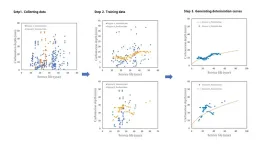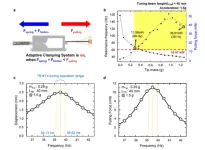(Press-News.org) Sixty-one organisations in the UK committed to a 20% reduction in working hours for all staff, with no fall in wages, for a six-month period starting in June 2022. The vast majority of companies also retained full-time productivity targets.
Now, results from the world’s largest trial of a four-day working week reveal significantly reduced rates of stress and illness in the workforce – with 71% of employees self-reporting lower levels of “burnout”, and 39% saying they were less stressed, compared to the start of the trial.
There was a 65% reduction in sick days, and a 57% fall in the number of staff leaving participating companies, compared to the same period the previous year. Company revenue barely changed during the trial period – even increasing marginally by 1.4% on average.
In a report of the findings presented to UK lawmakers, some 92% of companies that took part in the UK pilot programme (56 out of 61) say they intend to continue with the four-day working week, with 18 companies confirming the change as permanent.
Research for the UK trials was conducted by a team of social scientists from the University of Cambridge, working with academics from Boston College in the US and the think tank Autonomy. The trial was organised by 4 Day Week Global in conjunction with the UK’s 4 Day Week Campaign.
Companies from across the UK took part, with around 2,900 employees dropping a day of work. Organisations involved in the trial ranged from online retailers and financial service providers to animation studios and a local fish-and-chip shop.
Other industries represented include consultancy, housing, IT, skincare, recruitment, hospitality, marketing, and healthcare.
Researchers surveyed employees throughout the trial to gauge the effects of having an extra day of free time. Self-reported levels of anxiety and fatigue decreased across workforces, while mental and physical health improved.
Many survey respondents said they found it easier to balance work with both family and social commitments: 60% of employees found an increased ability to combine paid work with care responsibilities, and 62% reported it easier to combine work with social life.
“Before the trial, many questioned whether we would see an increase in productivity to offset the reduction in working time – but this is exactly what we found,” said sociologist Prof Brendan Burchell, who led the University of Cambridge side of the research.
“Many employees were very keen to find efficiency gains themselves. Long meetings with too many people were cut short or ditched completely. Workers were much less inclined to kill time, and actively sought out technologies that improved their productivity.”
Dr David Frayne, a Research Associate at the University of Cambridge, said: “We feel really encouraged by the results, which showed the many ways companies were turning the four-day week from a dream into realistic policy, with multiple benefits.”
Joe Ryle, Director of the 4 Day Week Campaign, calls the results a “major breakthrough moment” for the idea of shorter working weeks. “Across a wide variety of different sectors of the economy, these incredible results show that the four-day week actually works.”
In addition to the survey work, designed in collaboration with colleagues including Prof Juliet Schor from Boston College, the Cambridge team conducted a large number of extensive interviews with employees and company CEOs before, during and after the six-month trial.
Other pilots run by 4 Day Week Global in the US and Ireland – with research conducted by many of the same academics – have already reported their findings. However, the UK trial is not only the largest to date but also the first to include in-depth interview research.
“The method of this pilot allowed our researchers to go beyond surveys and look in detail at how the companies were making it work on the ground,” said Frayne, from Cambridge’s Department of Sociology.
In terms of motivations, several senior managers told researchers they saw the four-day week as a rational response to the pandemic – and believed it would give them an edge when it came to attracting talent in the post-Covid job market.
Some saw it as an appealing alternative to unlimited home working, which they felt risked company culture. Others had seen staff suffer through health problems and bereavement during the pandemic, and felt an increased “moral responsibility” towards employees.
“I hated the pandemic, but it’s made us see each other much more in the round, and it’s made us all realise the importance of having a healthy head, and that family matters,” said the CEO of a non-profit organisation that took part in the trial.
However, many said shorter hours were being discussed long before Covid as a response to demanding or emotionally draining work. The CEO of a video game studio pointed to high-profile examples of “crunch and burnout” in their industry as a reason for involvement in the trial.
Perhaps surprisingly, however, no organisation interviewed was taking part in the trials simply because technology had reduced their need for human labour.
Some companies stopped work completely for a three-day weekend, while others staggered a reduced workforce over a week. One restaurant calculated their 32-hour week over an entire year to have long opening times in the summer, but much shorter in winter.
A few companies in the trial attached strings to the reduced hours, including fewer holiday days, agreement that staff could be called in at short notice, or a “conditional” four-day week: one that only continued while performance targets were met.
Interviews documented how companies reduced working hours without compromising on targets. Common methods included shorter meetings with clearer agendas; introduction of interruption-free ‘focus periods’; reforming email etiquette to reduce long chains and inbox churn; new analyses of production processes; end-of-day task lists for effective handovers or next-day head starts.
When employees were asked how they used additional time off, by far the most popular response was “life admin”: tasks such as shopping and household chores. Many explained how this allowed them a proper break for leisure activities on Saturday and Sunday.
“It was common for employees to describe a significant reduction in stress,” said researcher and Cambridge PhD candidate Niamh Bridson Hubbard. “Many described being able to switch off or breathe more easily at home. One person told us how their ‘Sunday dread’ had disappeared.”
For some parents of young children, a midweek day off meant savings on childcare expenses. For those with older children, it meant some welcome ‘me time’. All reported doing more of the activities they already enjoy – from sport to cooking, music making to volunteering. Some developed new interests, while others used the time to get professional qualifications.
“When you realise that day has allowed you to be relaxed and rested, and ready to absolutely go for it on those other four days, you start to realise that to go back to working on a Friday would feel really wrong – stupid actually,” said the CEO of a consultancy organisation involved in the trial.
When it came to working culture, employees were generally positive, feeling more valued by their employer and describing a shared sense of purpose arising from efforts to make the four-day week a success.
However, several staff at one large company had concerns about intensifying workloads, while some at creative companies expressed disquiet over reduced worktime conviviality due to ‘focus time’, and argued that unstructured chat often generates new ideas.
By the end of the six-month trial, many of the managers said they could not imagine returning to a five-day week. “Almost everyone we interviewed described being overwhelmed with questions from other organisations in their industry that are interested in following suit,” said Burchell.
“When we ask employers, a lot of them are convinced the four-day week is going to happen. It has been uplifting for me personally, just talking to so many upbeat people over the last six months. A four-day week means a better working life and family life for so many people.”
NOTES:
4 Day Week Global was founded in New Zealand by entrepreneurs and philanthropists, Andrew Barnes and Charlotte Lockhart, following the world-renowned success of their pioneering trial of the four-day working week in Perpetual Guardian. The results of their earlier pilot in the US and Ireland can be read here: https://www.4dayweek.com/us-ireland-results
The research for this trial was conducted by research teams at Boston College in the US and University of Cambridge, headed up by Juliet Schor, Professor of Sociology at Boston College, Brendan Burchell, Professor of Social Sciences at University of Cambridge and Dr David Frayne.
Autonomy is a leading independent think tank focused on the future of work: https://autonomy.work
The 4 Day Week Campaign is the UK's national campaigning organisation for a four-day, 32 hour working week with no reduction in pay: https://www.4dayweek.co.uk
The design of the trial involved two months of preparation for participants, with workshops, coaching, mentoring and peer support, drawing on the experience of companies who had already moved to a shorter working week, as well as leading research and consultancy organisations. END
Working a four-day week boosts employee wellbeing while preserving productivity, major six-month trial finds
2023-02-21
ELSE PRESS RELEASES FROM THIS DATE:
Prisons and Probation Ombudsman should improve transparency in death investigations to improve prison safety, report finds
2023-02-21
The UK Prisons and Probation Ombudsman (PPO) must improve transparency when investigating prisoner deaths, according to a new report and policy brief by prison safety experts at the University of Nottingham.
The report, written by Dr Sharon Shalev, draws on research led by Dr Philippa Tomczak in the Faculty of Social Sciences, which offers recommendations to the PPO and policymakers for improving prisoner death investigations and promoting change.
Every year, hundreds of prisoners die in England and Wales — in the 12 months to September 2022, there were 307 deaths in prison custody1. These deaths will almost always be ...
How do parents decide if they should vaccinate their kids against SARS-CoV-2?
2023-02-21
For parents, the decision to vaccinate their kids against SARS-CoV-2 is complex, influenced by scientific evidence, political and social pressures, and views about individual versus collective benefits of vaccination, according to a new study published in CMAJ (Canadian Medical Association Journal) https://www.cmaj.ca/lookup/doi/10.1503/cmaj.221401.
Researchers conducted a qualitative study with in-depth interviews of 20 parents to understand their views about SARS-CoV-2 vaccination, with a goal to support future vaccination initiatives.
“Given the ...
Advocacy by LGBTQ+ school clubs may help combat student depression
2023-02-21
Advocacy by student-led Gender-Sexuality Alliance (GSA) clubs could help to reduce school-wide disparities in depressive symptoms between LGBTQ+ and heterosexual students, according to a new study.
The findings, published today in the Journal of Clinical Child and Adolescent Psychology, suggest that schools with GSAs (also known as Gay-Straight Alliances) that engage in more advocacy to highlight issues affecting LGBTQ+ students can help to promote well-being among LGBTQ+ youth across the wider school population.
“Discrimination ...
Does living along the US-Mexico border affect the chances of survival among children with leukemia?
2023-02-21
Residing in border regions was linked with a higher risk of dying within five years among children with acute lymphoblastic leukemia, the most common type of pediatric cancer.
In an analysis of cancer registry data from Texas, children with acute lymphoblastic leukemia (ALL) who lived along the border with Mexico were more likely to die within five years than those living in other areas of the state. The findings are published by Wiley online in CANCER, a peer-reviewed journal of the American Cancer Society.
The ...
New way to predict the damage and aging of bridges by using DNA. technologies
2023-02-21
The Korea Institute of Civil Engineering and Building Technology (KICT, President Kim Byung-Suk) announced that it has developed the D.N.A. (Data, Network, and AI) technologies to predict the levels of damage and aging of bridges for preventive maintenance.
As of 2021, the percentage of Korean bridges aged 30 years or more stands at a relatively low 12.5%. However, this ratio is expected to increase in the next decade to 39.3% by 2031 and rapidly spike up to 76.1% in 20 years. For the preemptive management of these aging bridges, the ...
Gameto licenses Wyss Institute tech to grow human ovaries in the lab
2023-02-21
Despite the fact that we all start out as an egg cell in one of our mother’s ovaries, these human reproductive organs are surprisingly under-studied. Scientists have been working on creating in vitro models of human ovaries so that we can learn more about them and develop treatments for ovarian conditions, but most existing models use a combination of human and mouse cells, which do not faithfully replicate human ovary functions and take a long time to grow in the lab.
Now, researchers at the Wyss Institute for Biologically Inspired Engineering at Harvard University, Harvard Medical School (HMS) and Duke University in collaboration with ...
Robot helps students with learning disabilities stay focused
2023-02-21
Engineering researchers at the University of Waterloo are successfully using a robot to help keep children with learning disabilities focused on their work.
This was one of the key results in a new study that also found both the youngsters and their instructors valued the positive classroom contributions made by the robot.
“There is definitely a great potential for using robots in the public education system,” said Dr. Kerstin Dautenhahn, a professor of electrical and computer engineering. “Overall, the findings imply ...
Most babies born to mothers with COVID-19 separated after birth resulting in low breastfeeding rates
2023-02-21
Most babies born to mothers with COVID-19 were separated after birth resulting in low breastfeeding and skin-to-skin contact rates during the height of the pandemic, according to a new global study.
The international research, led by Murdoch Children’s Research Institute in collaboration with the the European Society of Paediatric and Neonatal Intensive Care (ESPNIC), found that transmission of COVID-19 from mother to baby was rare and generally mild when it occurred. But despite this, almost half of all babies did not receive any breast milk, with ...
Cohesion and connection drop in ageing population
2023-02-20
Social cohesion and connection decline in an ageing population, according to a new study of one of humanity’s closest relatives.
For decades, researchers have been observing the rhesus macaques on Cayo Santiago (known as “Monkey Island”) in Puerto Rico.
Recent research showed that female macaques “actively reduce” the size of their social networks and prioritise existing connections as they age – something also seen in humans.
The new study, by an international team led by the University of Exeter, examines how this affects the overall cohesion and connection of the groups older monkeys live in.
While ...
Development of a self-resonant smart energy harvester
2023-02-20
The Internet of Things (IoT) requires the installation free of time and space, therefore, needs independent power sources that are not restricted by batteries or power lines. Energy harvesting technology harvests wasted energy such as vibration, heat, light, and electromagnetic waves from everyday settings, such as automobiles, buildings, and home appliances, and converts it into electrical energy. Energy harvesters can generate sufficient electricity to run small electronic devices by harvesting ambient energy sources without an external power supply.
The Korea Institute of Science and Technology (KIST, President Seok Jin Yoon) announced ...




